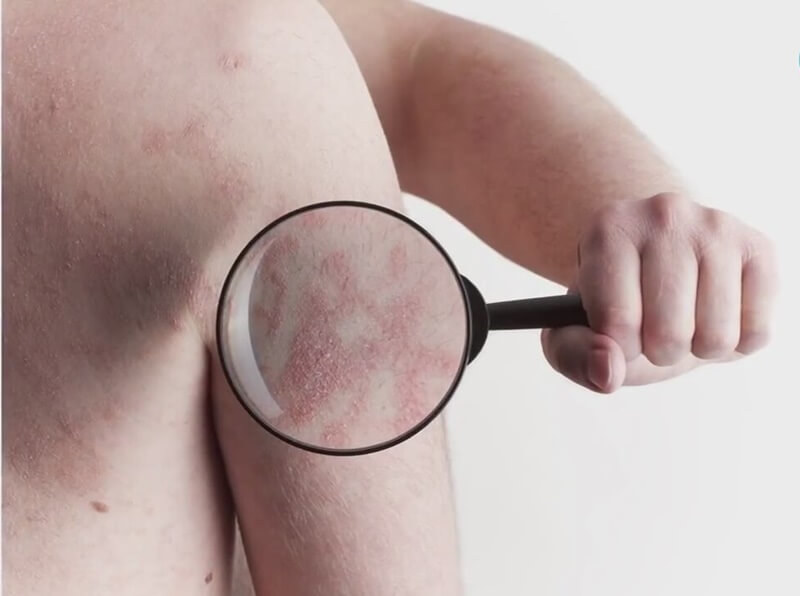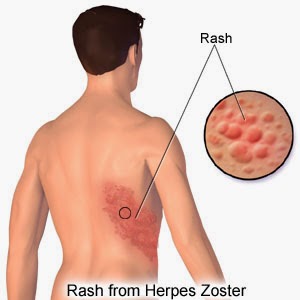SHARES

“1 in 3 people with chickenpox will develop shingles at some point during their lifetime. Surprisingly, this virus outbreak increases one’s risks for heart attack and stroke temporary from months to years.” Researchers are looking into this new piece of evidence. What causes higher risk for heart attack and stroke in people with shingles still remains an open question.
What is Shingles?
Shingles is caused by the same virus as chickenpox, namely varicella zoster virus (VZV). Usually, most people will get chickenpox during childhood. After exposure, the virus may hide in our nerve cells without causing any symptoms for a long time. It waits patiently until the day when our immune system is down (having less antibodies against the virus) to become active again. This time, it manifests itself differently in the form of a shingles outbreak.
Just like chickenpox, the virus replicates itself and shed off in open, oozing blisters. People coming in contact with the oozes may get infected by the virus, causing chickenpox in those without immunity. As compared to chickenpox, shingles usually affect only a patch of skin in the form of a band shape. Also, the blisters can be very painful and may last for a long time even after the blisters crust over.
Increased Risk for Heart Attack and Stroke
Studies show that heart attack and stroke risks increase (59% and 35% respectively) temporary for months to years after shingles. Majority of the cases happen within 12 months following an attack.
Most of the affected persons are women, people older than 50 years old, and those with high blood pressure, diabetes, high cholesterol. These are also the risk factors for heart attack and stroke. This may be simply because more people with advanced age having weakened immunity towards shingles, as well as having poorer heart health as their age increases.
It is still inconclusive about any cause-and-effect relationship between shingles and heart attack or stroke. The reverse is also true.
Explanation for Heart Attack and Stroke Risk
Recent studies are pointing towards a possible common culprit responsible for shingles, heart attack and stroke as well. This is the macrophage or “gluttonous immune cell”. Under normal circumstances, this type of immune cell gobbles up anything harmful to our body and get rid of it. For instance, in our arteries, these immune cells are known to help clear up harmful molecules (lipoproteins) that damage and thicken our artery wall.
However, when these immune cells become “sugar-craving”, they become very busy at gobbling up sugar while acting differently. As a result, they cause more inflammation and worsen artery wall thickening (atherosclerosis). Eventually, this leads to stroke and heart attack as the arterial wall plaques break off and occlude smaller vessels in the brain and heart.
Similarly, these immune cells are responsible for gobbling up any harmful viruses and destroying body cells that are infected by active virus. They also play an important role in recruiting cells that are responsible for antibody production. All these defences kill any varicella zoster virus readily as soon as they reactivate. Yet, when these immune cells become sugar-gluttonous, they fail to recruit antibody producing immune cells to the battle field. This causes weaker defence and gives the virus a chance to reactivate, causing shingles.
Conclusion
Shingles increases heart attack and stroke risk temporary for few months to years. The cause-and-effect relationship as well as mechanism still remains inconclusive. Have a talk with your doctor and follow up closely after shingles if you’re at a higher risk profile.
Find a GP/Family Doctor and Cardiologist in Malaysia, on GetDoc
Find a GP/Family Doctor and Cardiologist in Singapore, on GetDoc
References:
1. Newman T. Can shingles raise the risk of heart attack [MedicalNewsToday]? WebMD LLC. 2020. (Available from: https://www.medicalnewstoday.com/articles/318218; last updated on 2017 Jul 4; last accessed on 2020 May 19)
2. Goldman B. Scientists tie heart patients’ increased shingles risk to glucose-gobbling immune cells. Stanford Medicine. 2020. (Available from: https://med.stanford.edu/news/all-news/2017/06/heart-patients-increased-shingles-risk-tied-to-immune-cells.html; last updated on 2017 Jun 12; last accessed on 2020 May 19)
by Chang Xian
View all articles by Chang Xian.







